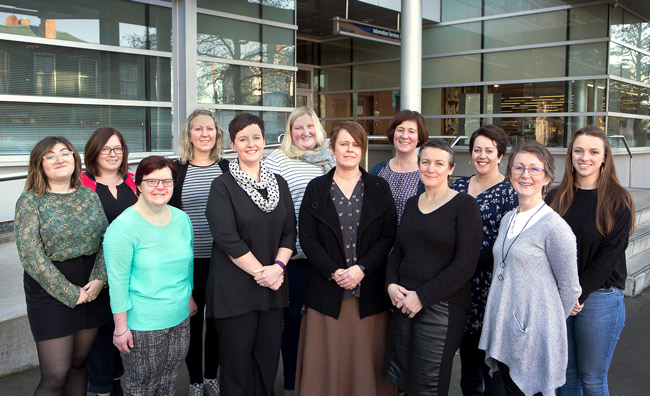Monday 11 June 2018 2:36pm

The University’s Disability Information and Support team: Back row (from left) Alexus Jordyn-Edser, Rebecca McFadyen, Ali Charlton, Laura Starling, Emma Holt, Toni Patterson-Gallagher and Meghan Kruskopf. Front row (from left) Kerry Twemlow, Melissa Lethaby, Jackie Fox, Jenny Weeks, and Rachel ‘Aluesi. Photo: Sharron Bennett.
The University is a proud leader in the field of disability support in the tertiary education sector – with more students than ever before accessing the services of Otago’s Disability Information and Support.
Manager, Melissa Lethaby, says there has been a 20 per cent increase in students accessing the service compared to the same time last year, with the service hiring casual staff to assist with the rise.
“It’s very significant for us as a service and equates to an additional 40 student appointments per week plus an additional 7,000 contacts for the past month alone,” she says.
"It’s very significant for us as a service and equates to an additional 40 student appointments per week plus an additional 7,000 contacts for the past month alone."
The services offered by the office are broad – and all aim to help students with impairments to achieve their full potential. These include a note-taking service; the provision of sign language interpreters; services to reformat printed materials to better suit an individual’s needs, for example in large print, plain English, digital, audio and e-text; helping students who experience difficulty sitting exams and tests under conventional circumstances make alternative arrangements – such as providing readers, writers, additional time or alternative formats for exam papers; the provision of quiet study rooms; and assisting students with mobility issues better access the campus.
Ms Lethaby says the increase in students accessing the service is likely due to increased awareness across the University of the services it provides.
“We receive referrals to our service via a number of pathways and have done our very best to raise awareness of the services we offer, both internally and externally,” she says.
“We also find that a number of students acquire some form of disability and/or impairment during their time at Otago and right now sporting injuries and concussions are prevalent. If the ski season is as good as expected, Disability Information and Support will see a lot more students with temporary impairments. While this puts pressure on us to meet student’s impairment related needs, the support offered is particularly beneficial to them, as without it they may have to take a semester out to recover.”
Ms Lethaby says the service is one of the most cost effective and efficient disability support services in the country, with other institutions adopting some of Otago’s processes to cope with their own service demands.
Speed is important, she says, because the academic year is relatively short “so any delays in accessing support can be detrimental to students both in terms of their academic success and wellbeing”.
"We strive to provide an outstanding experience for students and these results are extremely satisfying and motivating."
The increase in students utilising the service is backed up by positive feedback. The 2017 Quality Advancement Student Opinion Survey – Support Services Improvement Survey indicated that an incredible 92 per cent of respondents were either “extremely satisfied” or “satisfied” with the service. In addition, last month’s Happy or Not report indicated that 99 per cent of students were very positive about their experience at the service’s reception.
“We strive to provide an outstanding experience for students and these results are extremely satisfying and motivating,” Ms Lethaby says.
The University created the service in 1992, after a Disability Action Group identified a need for academic support for students with impairments enrolled at Otago. It began as the “Disabilities Office” and became “Disability Information and Support” in 2000.
Since then the service has thrived, and Disability Information and Support is proud to be a leader in the field of disability support in tertiary education.
“We have a good reputation both within New Zealand and beyond, so our good networks ensure students are well supported to transition into the university environment and throughout their academic journey.
“We pride ourselves on working in partnership with students, as really they are best place to determine their own support needs and this is supported by documentation confirming their need for reasonable accommodations.”
She says staff are the service’s greatest asset, and she is “absolutely fortunate” to lead such a fantastic team.
“Every single staff member goes above and beyond to ensure student support is implemented in a timely manner. We have a fantastic workplace culture and consider it a privilege to work alongside students.”